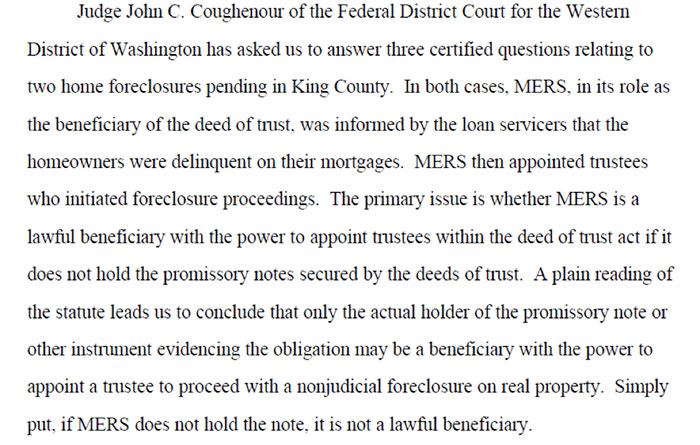IF THE MONTGOMERY COUNTY RECORDER’S CASE VERSUS MERS WERE A CHESS GAME … MERS JUST LOST ITS QUEEN!
 “For the reasons so stated, the Defendants’ (MERS) Motion to Dismiss is granted as to Count II of the Complaint, alleging civil conspiracy, and denied as to the remaining counts.”
“For the reasons so stated, the Defendants’ (MERS) Motion to Dismiss is granted as to Count II of the Complaint, alleging civil conspiracy, and denied as to the remaining counts.”
In a 35-page Memorandum and Order, U.S. District Court Judge James Curtis Joyner (E. Dist. Pa.) dismissed Montgomery County Recorder of Deeds Nancy Becker’s claim for civil conspiracy, but left intact her claims, as part of a putative class action on behalf of all other Recorders in Pennsylvania, that could force MERS and its member-subscribers to record every single missing document to every single MERS mortgage to perfect each property owner’s chain of title and pay the appropriate fees due at the time of recording.
You gotta love this woman’s chutzpah, to move forward and take on a multi-billion-dollar-a-year private electronic database that she alleges in her case, has wreaked havoc on over 130-thousand mortgage filings in her county alone.
In the Memorandum and Order Joyner issued October 19, 2012, Becker would be allowed to pursue a quiet title action against MERS and MERSCORP, Inc. and seek declaratory and injunctive relief to boot. Becker filed the suit on November 7, 2011, alleging that “MERS was formed for the express purpose of avoiding fees traditionally due to county recorders of deeds when sales or assignments of mortgages were made. She further pleads that the absence of these recorded assignments as part of the Defendants’ avoidance of recording fees both deprives her office and Montgomery County of revenue needed to support vital public functions and creates deficient property records.” (Emphasis supplied here by the author herein) This is what I’ve been alleging ever since I wrote Clouded Titles. It’s not just about the money; it’s about the destruction of chains of title that every MERS mortgage or deed of trust ever touched.
Also cited in the Memorandum were the cases against MERS and MERSCORP in both Dallas County, Texas and Geauga County, Ohio, both of which are still in play. MERS attempted through various ploys to get itself dismissed from the complaint in Dallas County by removing it to federal court; subjecting it to the Multi-District Litigation (MDL) backpanel in Arizona, only to find itself back in federal district court in Dallas in the same fashion, dismissed in part and denied in part. There’s still the issue of a Texas statute at § 192.007 (Texas Government Code) that requires ALL subsequent assignments and transfers be recorded.
This author and his audit team just completed an audit of a county’s land records, to discover multiple issues that could spell fate not just for the Reston, Virginia-based MERS/MERSCORP, but also for multiple attorneys whose signatures appear as wide and varied as Linda Green, the infamous robosignor exposed in CBS’s 60 Minutes piece in April of 2011. Like other counties, the audited county suffered the same dilemma as Pennsylvania Recorders in a drop of badly-needed revenue due to the lack of recordation of transfers and assignments once the initial MERS mortgage or deed of trust is recorded.
As usual, MERS’ attorneys argued a wide range of assertions, including their claim that Becker did not “invoke the availability of quiet title relief in her pleadings. Nor did she argue that the facts she pleaded state a quiet title claim.”
Alas, quiet title will out. The Court took several pages of the Memorandum to discuss the construction and interpretation of what the Pennsylvania Legislature intended when it created the original quiet title statutes; repealed and revised same; and came up with enough conclusive discussion to keep MERS and MERSCORP locked into this lawsuit, concluding “that the Plaintiff (Becker) has pleaded sufficient fact to proceed on her unjust enrichment claim …”
I know it seems like there was a consortium of banks and mortgage associations out there that helped mold this electronic database into the monster that it has become in the legal arena and the nightmare that it has become in the land records, obfuscated by a largely unregulated, privately-held database that seems to work in opposition to the system of public recordation that has existed since the 1600’s. In retrospect, the pleadings for civil conspiracy (as much as we’d like to form a lynch mob on this one) were insufficiently pleaded and for all intents and purposes were a “reach”; but hey, every other claim, including the discussion of 21 Pa. Stat. § 351, which would require recordation of all mortgage assignments, stuck. On Page 14, the Court wrote:
“Accordingly, we conclude that “all … conveyances … shall be recorded,”
21 Pa. Stat. § 351, means that all conveyances shall be recorded.
How much more plain can you get? The Court also concluded:
“Pennsylvania law permits any person in any manner interested in a conveyance,
(including the County Recorder of Deeds trying to preserve the land records)
such as a mortgage assignment, to bring a quiet title action under Pennsylvania Rule
of Civil Procedure 1061(b)(3) to compel the person with the appropriate documents
in his or her possession to record them.”
What a novel idea … use quiet title to compel MERS (by and through its members) to record every single missing assignment to perfect every single land record in the State of Pennsylvania … and pay the recordation fees it should have paid in the first place to boot! This suit may serve as a template for other counties and states to follow, especially if the outcome looks as promising as the content of this Memorandum.
And so case No. 11-cv-6968 in the Eastern District of Pennsylvania moves forward with all eyes watching, waiting for the checkmate.
